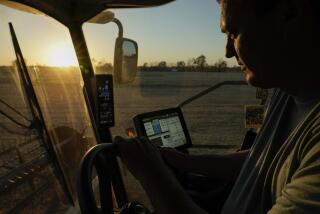Global warming endangers U.S. corn production, study says
- Share via
WASHINGTON — Global warming could rob the U.S. economy of $1.4 billion a year in lost corn production alone, a national environmental group estimated in a report released Thursday.
The Environment America study, based on government and university data, projects that warming temperatures will reduce yields of the nation’s biggest crop by 3% in the Midwest and the South compared with projected yields without further global warming.
Iowa would be hit hardest, losing $259 million a year in corn revenues, followed by Illinois at $243 million. California, which leads the country in agriculture but doesn’t grow much corn, would take an estimated $4.7-million hit.
The study doesn’t directly address other crops, but one of its main sources, a 2008 government report on the effects of warming on agriculture and natural resources, suggests that California’s signature fruit and vegetable harvests could suffer even more than corn if temperatures rise.
“Corn likes it cool, but global warming is raising temperatures across the nation,” said report author Timothy Telleen-Lawton in a news release. “Hotter fields will mean lower yields for corn, and eventually, the rest of agriculture.”
Telleen-Lawton said the estimates of revenue loss were tied to expected increases in temperature and carbon dioxide levels that could be reached within the next few decades if steps were not taken quickly to cut the amount of greenhouse gases emitted into the atmosphere.
The report is a direct challenge to other studies, often cited by critics of government efforts to curb greenhouse gas emissions, that project moderate warming would increase crop yields.
Higher carbon dioxide levels would help plants grow, Princeton University physicist William Happer, a critic of emissions limits, told a Senate committee this year.
“Crop yields will continue to increase as CO2 levels go up,” he said in submitted testimony, “since we are far from the optimum levels for plant growth.”
The report by Environment America, an environmental advocacy group, contends that damaging effects from warming would far outweigh a carbon-fueled yield boost.
“Not all the effects of global warming will be bad for agriculture; growing seasons will be longer, and increased carbon dioxide levels encourage plant growth,” the report says.
“But global warming will make some of the challenges that agriculture faces significantly worse, including increasing temperatures, more damaging storms, ozone pollution, and spreading pests, weeds, and diseases.”
The report doesn’t attempt to quantify losses from storms, floods, insects and ozone pollution related to global warming. It calculates damages based on warming temperatures, which could rise above corn’s optimum growing range of 64 to 72 degrees Fahrenheit during the growing season.
It also says farmers can help fight global warming -- and the government can encourage their efforts -- in part by turning some of their land into wind and solar energy farms.
But the report stays silent on the fate of perhaps the most touted -- and politically controversial -- intersection of U.S. agriculture and global warming: corn ethanol, which proponents call a path away from fossil fuels but which critics say could cause as much global warming harm as good.
--






